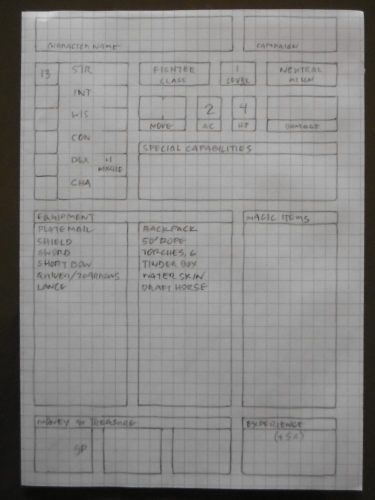“Roll these dice six times.”
Garth pushed three Yahtzee dice across the blue notebook that lay flat between us. We were sitting on the floor in his room. He leaned against the bed.
Having watched Kaytar explore the dungeon and defeat the wizard, I was ready, by Garth’s decree, to play this new kind of game he called “medieval fantasy adventure role-playing.”
I sat cross-legged. I had a pencil and an old copy of Better Homes and Gardens, which supported a blank sheet of ruled paper.
“When can I roll that one?” I eyed the dice that looked like a ball it had so many sides. The color was light blue like a summer sky. Each side was a small triangle, just big enough to fit a number. The edges were worn and rounded.
“That’s for attacking monsters and making saves. We’ll get to that later. First, you have to make a character.”
I cupped the dice in two hands and dropped them on the notebook.
“Thirteen. Good,” he said. “Write down ‘strength’ with thirteen next to it. That means you’re pretty strong. You can be a fighter.”
“Can I cast magic spells like Kaytar?”
Garth pursed his thin lips into a flat pucker. He did that when he was doubtful about something. “Playing a magic-user is more complicated. It’s easier to start with a fighter.”
I rolled the dice five more times and recorded the numbers on the sheet next to “intelligence,” “wisdom,” “constitution,” “dexterity,” and “charisma.”
Garth explained what each score meant, adding, “Anything higher than ten is above average.”
Other than the strength and a dexterity score that gave the character a bonus to “missile fire,” my fighter was mediocre.
I rolled another dice for “hit points,” which, the way Garth explained them, were more like life points. Then Garth told me to roll the three dice again.
Reading the results, he said, “You have one-hundred fifty gold pieces.”
“What are gold pieces?”
“Pieces are coins. There are other kinds too, like copper, silver, and platinum. Platinum is the most valuable.”
This brought to mind a pirate’s chest buried in a dune. “So, is it a treasure?”
“Not really, it’s just money you have to start with. You use it to buy equipment to go down into the dungeon. That’s where you’ll find the real treasure.”
He gave me the pale blue book open to a page with lists of items and their costs. “You’ve got plenty to get everything you’ll need for the adventure.”
I scanned the lists and asked a bunch of questions, mostly of the sort “What’s that and what’s it for?”
I understood most of Garth’s answers, though my imagination ran a bit far with “morning star,” and I was flummoxed by the concept of a “pole arm.”
In addition to newfound knowledge in medieval weaponry, from the list I learned about some other terrifying monsters I might encounter and how to combat them. There was a mirror for use in fighting medusas, holy water to throw on undead—which weren’t living either, wolfsbane against not just werewolves but a whole family of were-creatures, garlic to repel a vampire, and stakes to drive through its heart.
I wanted to buy one each of those with my gold pieces, but Garth assured me I wouldn’t need them this time.
“What’s the difference between a ‘draft horse,’ a ‘light horse,’ and a ‘warhorse’?”
“You don’t need a horse. You’re going into a dungeon.” Garth pursed his lips again. “Look, all you need is armor, a missile weapon, and a melee weapon.”
“What’s a may-lay weapon?”
“It’s for hand-to-hand combat, like a sword.”
After more questions and not a little time, in which Garth’s impatience grew, I decided on plate mail armor and shield, which Garth said gave me a good “armor class,” a sword, bow and arrows, and rope, water skin, torches, tinder box, and a back pack to carry it all in.
I wrote these in a list on the sheet and subtracted the cost from one-fifty. With remaining funds, I added a lance to my armament.
“If I don’t get a helmet, I have enough money for a draft horse. I could be a knight on a horse with my lance.”
“A draft horse is for plowing fields and pulling carts.”
I could not be deterred. Garth relented. “Okay, spend your money on a horse, but you can’t take it into the dungeon—or a lance either!”
That settled, Garth explained a concept he called “alignment.” I understood there were good guys and bad guys, like when we used to play cops and robbers. I wanted to be a good guy, but Garth advised me to play a neutral character to start, and I didn’t argue.
“Okay,” Garth said, “you can think of a name later. You’re in a tavern…”

Recreation of My First D&D Character.
Pingback: Further Adventures with Kaytar – DONJON LANDS